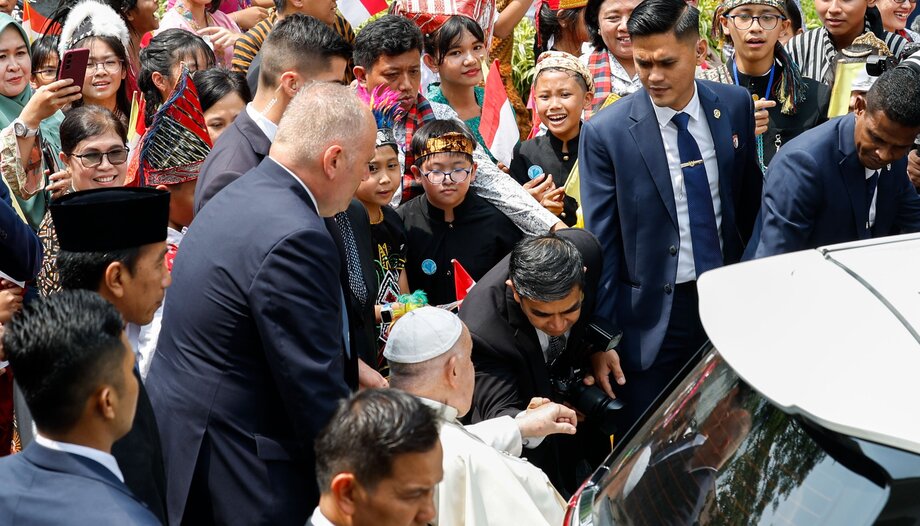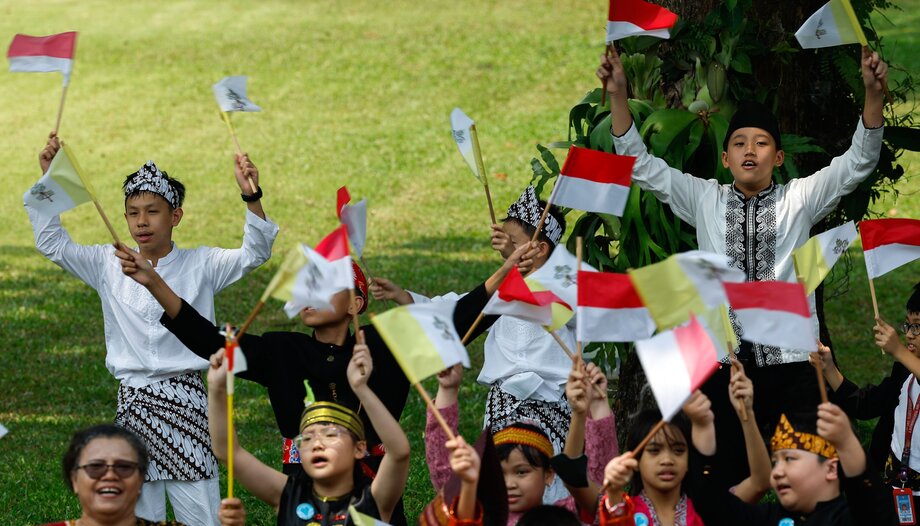After the welcoming ceremony, the children's folk dances and the signing of the book of honor at the Presidential Palace, the Holy Father met privately with Indonesian President Joko Widodonen and the country's Foreign Minister. Cardinal Secretary of State Pietro Parolin and the interpreters were also present.
The Pope described as essential interreligious dialogue and the fight against extremism and intolerance, which distort religion, as well as the formation "of a more balanced social fabric" with "equitable social assistance," the pontiff said as he met at the Presidential Palace -the Istana Negara-The event was attended by the authorities, the diplomatic corps, civil society and businessmen, a total of some 300 people.
The Pope began his remarks by recalling that "just as the ocean is the natural element that unites all the islands of Indonesia, mutual respect for the cultural, ethnic, linguistic and religious characteristics of all the human groups that make up Indonesia is the essential connective tissue to make the Indonesian people united and proud."
The Holy Father also stressed the importance of promoting harmony among the different religions in a country where, along with the Muslim majority, there are 10 % Christians, of whom only 3 % are Catholics.

The Pope assured that "the Catholic Church places itself at the service of the common good and wishes to strengthen collaboration with public institutions and other subjects of civil society, in order to favor the formation of a more balanced social fabric and to guarantee a more efficient and equitable distribution of social assistance".
He further stated that "harmony in respect for diversity is achieved when each particular vision takes into account the common needs and when each ethnic group and religious confession acts in a spirit of brotherhood, pursuing the noble objective of serving the good of all".
Francis invited to "foster peaceful and constructive harmony, which guarantees peace and unites forces to overcome the imbalances and pockets of poverty that still persist in some areas of the country", leaving on record that "the Catholic Church wishes to intensify interreligious dialogue" so that "prejudices can be eliminated and a climate of mutual respect and trust fostered, which is essential to face common challenges, including that of combating extremism and intolerance, which - by distorting religion - seek to impose themselves through deception and violence."
"In various regions," the Pontiff added, "we see violent conflicts arising, which are often the result of a lack of mutual respect, of an intolerant desire to make one's own interests, one's own position or one's own partial view of history prevail at all costs, even if this entails endless suffering for entire communities and gives rise to real bloody wars.
The pontiff added that "harmony in respect for differences is achieved when each particular opinion takes into account the needs that are common and when each ethnic group and religious confession acts in a spirit of fraternity, pursuing the noble goal of serving the good of all".
"This wise and delicate balance," the pontiff added, addressing the Diplomatic Corps and authorities, "between the multiplicity of cultures, the different ideological visions and the reasons that underlie unity, must be continually defended against any imbalance.
After the event at the Government Palace and on his return to the Nunciature, the Pope held a private meeting with members of the Society of Jesus, as he usually does on his trips.
Cathedral of Our Lady of the Assumption in Jakarta
At the Cathedral of Our Lady of the Assumption in Jakarta, the main Catholic place of worship in the Indonesian capital, as well as the seat of the archbishopric in the center of the city, Pope Francis was received in an atmosphere of great joy by the children waiting for him outside and by all those present.
After the welcoming greeting of the President of the Episcopal Conference and after listening to the testimonies of a priest, a nun and two catechists, and the harmonious singing of the choir that moved those present, the Pope invited them to recognize each other as "brothers, equal also in diversity".
He pointed out that in Africa, one of the presidents told him that "he had been baptized by his father who was a catechist" and recalled that catechists, together with mothers and grandmothers, carry the faith. And with affection he said: "I am very grateful to the catechists, they are good", he exclaimed.
"I encourage you to continue in your mission," the Holy Father added, "strong in faith, open to all in fraternity and close to each other in compassion. And he invited: "Go to the crossroads of the road. But that one? ... all of you!!!". "Go ahead with brotherhood". He concluded, "Faith, brotherhood and compassion. I bless you and thank you for all the good you do in these islands."
After the blessing there was a photo with the bishops, and the movement of many present who tried to greet him.
From the cathedral, the Pontiff went to the Grha Pemuda Youth House for a meeting with more than a hundred children, young people and adolescents, many of them wearing the veil, who welcomed him with songs and music. There he also met with the leaders of Scholas Occurentes, an initiative to promote young people that was born as neighborhood schools in Buenos Aires and expanded under the pontificate of Francis.
At the entrance of the hall there was a heart-shaped marquee, inspired by a polyhedron, made by the young people with which they wanted to leave their mark.
A teacher, moved to tears, told the Pope her experience, followed by that of a boy wearing a Scholas T-shirt and a girl without a veil who was also wearing a Scholas T-shirt.
The Pope, addressing the young people, in dialogue with them, pointed out the need for reality to be concrete, not to live in an unreal world, otherwise, he said, "you will be a schizophrenic".
"In life," he said, "there are four principles for coexistence and peace: reality is superior to the idea; unity is superior to conflict; the whole is superior to the part. And he invited to "make peace with everyone".
After giving some gifts to the Pope, a mangrove tree was planted.
In closing, the Holy Father explained that the blessing means "to commend well." "There are people of different religions here, and I will give it to everyone" as they prayed in silence. The meeting concluded with a group photo.







